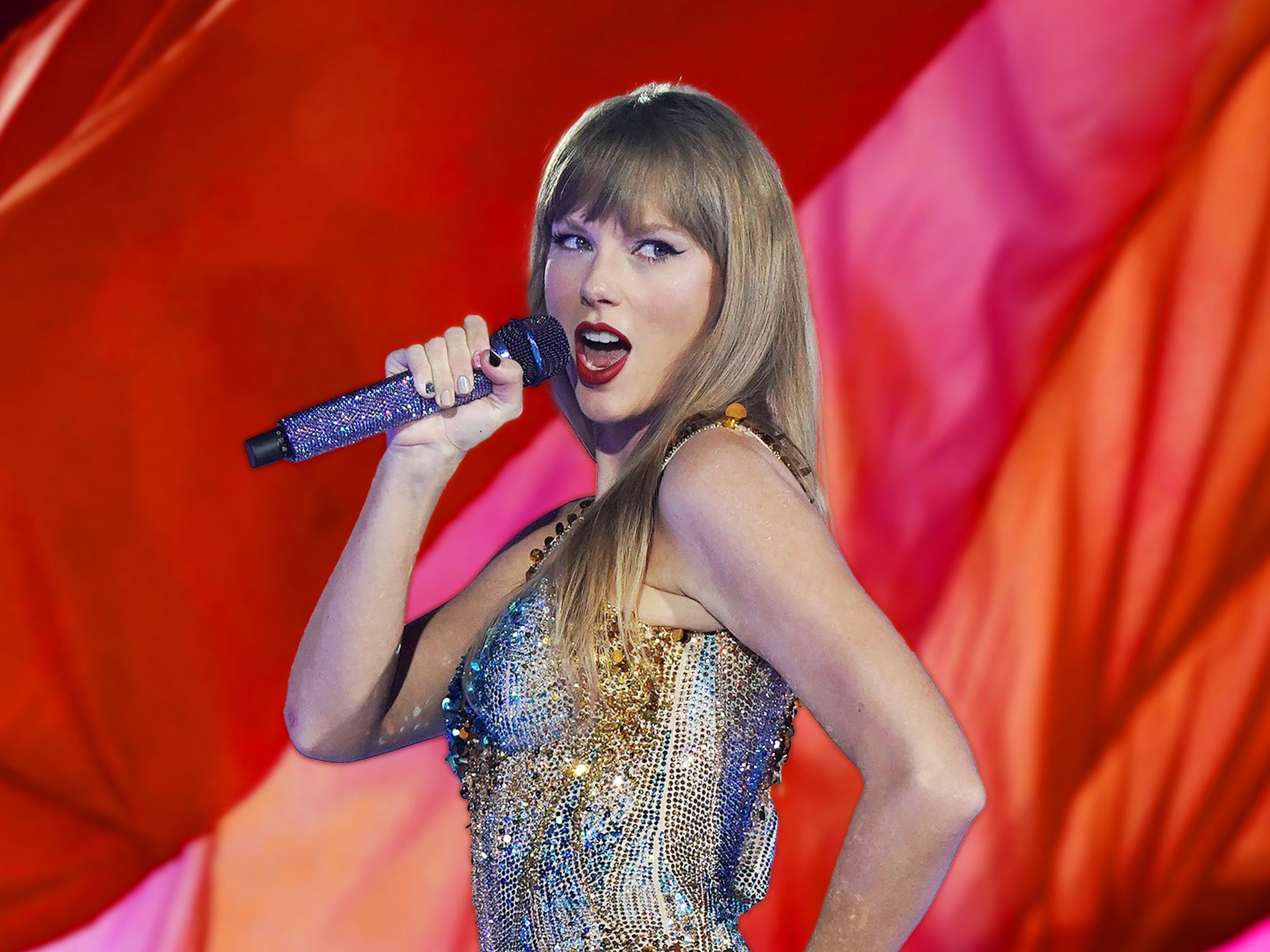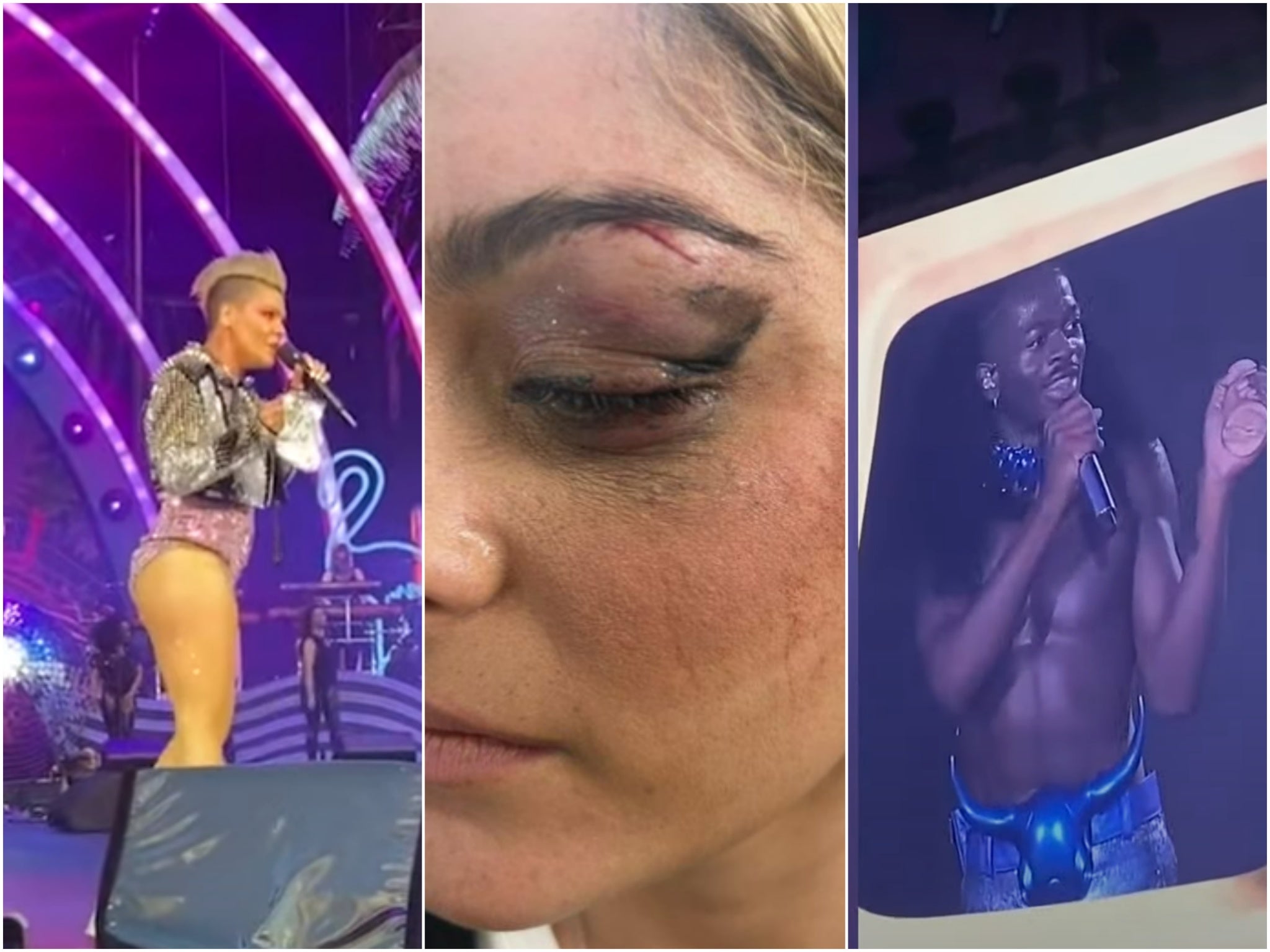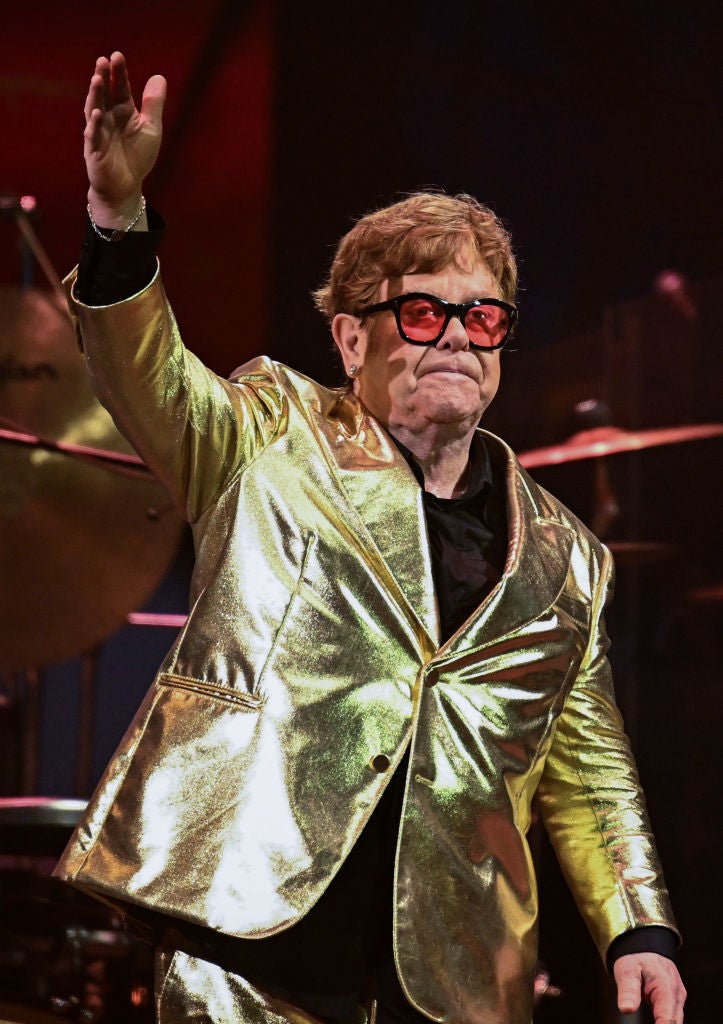Hurled phones, Ticketmaster queues, dodging ashes: How live gigs became a living hell
Between the eye-watering ticket prices and the rise in crowd violence, going to see your favourite artist in concert has never been more miserable, writes Ed Power. Could things get even worse from here?

Under the bruised steel sky of London at sunset, Abel Tesfaye walked among his people. But had the artist – who performs as The Weeknd – taken a moment to look around at his London Stadium show this week, he might have noticed a minor disturbance a few feet away. An annoyed fan stepped forward and snatched a handmade sign from the grip of another concert-goer. The footage went viral on TikTok with the caption, “No signs blocking our view here.”
It was just the latest concert flashpoint to create a thunderclap on social media. Days earlier, in Vienna, pop princeling Harry Styles was struck in the eye by an object hurled from the crowd. On 30 June, a sell-out date by folk messiah Hozier welcomed a group of enthusiastic rugby players. “I’m sorry but the rugby squad who were at Hozier tonight were the worst,” tweeted one Hozier-head. “[They] talked all the way through, went on shoulders… and just kept making weird hand gestures.”
Ripped signs, hurled objects, rugby players making weird hand gestures… has concert-going turned into a living hell? Surveying these and other incidents that have rippled across Twitter and Instagram, it would be easy to conclude that attending a gig has become a collective punishment ritual. If someone with a sign doesn’t block your view, there’s a decent chance a rugby player might try to sit on you.
Even if they don’t, consider all the other annoyances. Styles was just the latest celebrity clobbered by over-enthusiastic fans. In June, Pink was dumbstruck when someone chucked a bag containing their mother’s ashes on stage. That same month, singer Bebe Rexha required stitches after being struck in the face by a phone mid-performance in New York. “I thought it would be funny,” said the assailant following his arrest.
More generally when going to a concert, you often feel that you are among people who have forgotten how to behave in public. Watching a gig through your smartphone is now standard etiquette. At a recent indoor Lana Del Rey show, I was shocked when the person in front of me pulled out a vape and began puffing with gusto.
“Post-pandemic, the events industry has seen troubling changes in audience behaviour,” says Chris Barrett, editor of Access All Areas, which covers live outdoor events. “Take the Euro 2020 final at Wembley Stadium, the tragedy at Brixton Academy [in which two people died in a crush last December] and look further afield to the 151 killed during a Halloween celebration in South Korea, 10 deaths after a stampede at the Astroworld festival in the US, and 125 dead after a crowd crush at an Indonesian football match. The list goes on and on.”
Unruly audiences are only one of the challenges facing live music. Setting aside this far more serious issue of performers being struck with missiles, there is also the ordeal of getting into a show in the first place. Before the purgatory of signs blocking your view and people vaping in your face, gig-goers must run the gauntlet of the Ticketmaster queue.
Promoters and event owners are coping with a huge rise in event production costs, from personnel to power, while major artist fees show no sign of falling any time soon
Consider the plight of Taylor Swift fans who face having their 2024 ruined as they try in vain to gain access to the singer’s European tour. Demand vastly exceeds supply, and the system is struggling to cope, with technical glitches forcing the French arm of Ticketmaster this week to halt Swift ticket sales while some 700,000 were still in the queue. June 2024 is a good 12 months away. Yet, for forlorn Swifties who can’t get tickets for the Eras dates across Europe, it already has the potential to be a cruel summer.
Thus far on the US leg of the Eras tour, nobody has dared invade Swift’s private space with a hurled phone. But who’s to say that situation won’t change, with flinging phones becoming an unwelcome trend over the past several months. “I have seen [objects thrown at performers] this year,” says one musician who has spent the past several months playing across the continent. “At festivals, you see artists getting phones chucked at them or coins. It’s scary.”
“It’s fair to say that at The O2 we’ve definitely seen, across multiple genres, a change in audience behaviour,” Emma Bownes, vice-president of venue programming at London’s O2 arena, told the International Live Music Conference last March. “I go to the Edinburgh Fringe Festival every year, and I noticed a massive trend in quite aggressive heckling. Heckling’s always been a thing in comedy, but it’s not as prevalent as it definitely is now.”
Even before the pandemic, experts said there was a notable shift in how people behaved in public spaces. That has accelerated following two years of lockdown, with an entire generation emerging from Covid to attend their first concerts. The situation is exacerbated by the loss, during Covid, of veteran music industry workers. They haven’t come back, and those who have replaced them don’t always have the same level of experience.
“Many of the staff had moved away, doing other jobs. A lot of the knowledge and understanding about events had gone out of the top of the industry because you’d lost a lot of managers and at the bottom because you’d lost a lot of staff. That creates a different interface when the events start,” says Professor Chris Kemp, chief executive of crowd safety consultants Mind Over Matter. “The staff get quite frightened of the way people are acting. People are going, ‘Oh, it’s terrible.’ Well, actually, anybody stuck inside for a couple of years is going to really go for it when they go for events. That shouldn’t have been unexpected.”

Another factor that has contributed to the ordeal of gig-going is ticket pricing. These have soared post-pandemic by an average of 19 per cent, according to Pollstar, which compiles dates on the global concert industry. Some prices are eye-watering. For instance, standing tickets for Swift’s 2024 Wembley shows come in at £110.40. The impact on fans is real. More than half of concert-goers have skipped a gig in the past five years due to “prohibitive ticket prices”, according to a YouGov poll from December. Some 18 per cent said they were “regularly” priced out of live events.
“It’s over. The old days are gone,” is how heritage rocker Neil Young characterised climbing prices in March. “I get letters blaming me for $3,000 tickets for a benefit I am doing. That money does not go to me or the benefit. Artists have to worry about ripped-off fans blaming them for Ticketmaster add-ons and scalpers. Concert tours are no longer fun. Concert tours are not what they were.”
Higher prices bring different audience expectations, says Prof Kemp. “If you’re paying an extra 50 per cent for a ticket, or whatever it is, you expect a level of service commensurate with the money you’re paying. You go into somewhere that doesn’t give you that, and you’re going to complain. Theatres [and] events are finding this complaint culture is going up and up and up.”
“I feel like there’s an increased expectation when you get to the gig,” said The O2’s Bownes in March. “With some individuals, if it’s not perfect, then they’re willing to kick off with the audience member who might be stood up in front of them.”
Still, whatever Neil Young might think, higher ticket costs aren’t entirely down to industry greed. The cost of touring has sky-rocketed by 30 per cent, according to the Association of Independent Festivals. “Promoters and event owners are coping with a huge rise in event production costs, from personnel to power, while major artist fees show no sign of falling any time soon,” says Barrett, who warns smaller artists are feeling the pinch.
“As a result, an increase in ticket prices was inevitable. While the huge tours by acts such as Elton John, Coldplay and Ed Sheeran, and major festivals including Glastonbury and Download, have done incredible business, lesser known acts and festivals are seeing much slower sales. It appears the appetite is strong for bucket-list events but consumers have become more discerning.”
With ticket prices climbing, young music fans – the lifeblood of the industry – risk being priced out. “I have seen research that suggests teenagers are far less likely to attend shows than pre-pandemic,” says Barrett. “There is also the issue of shows being unaffordable for many young people. Naturally that has caused concern in the industry.”

Others feel the industry is cashing in, even accounting for inflation. “Obviously, there are increasing costs for venues, but there are a lot of unnecessary additional costs such as extortionate booking fees, secondary ticketing etc,” says Dan Garber, a music business veteran who has worked in event management, radio, marketing and artist development. “I think a lot of companies are taking advantage of inflation to inflate their own prices. I suppose from a business perspective, if fans are prepared to pay those fees then that’s why they are charging them. It doesn’t mean it’s right though.”
Yet despite the sense that concert-going has become increasingly unpalatable, big tours continue to sell. UK live music revenue will exceed its 2019 pre-pandemic peak this year and will grow 7.4 per cent per year until 2027, according to a report by PricewaterhouseCoopers.
Nor, it should be acknowledged, are modern audiences the first to throw objects at performers. David Bowie was struck in the eye with a lollipop in 2004 – an incident that put him off touring for the rest of his life. Oasis threatened to walk off stage supporting REM at Slane Castle in 1995 when punters started pelting Liam Gallagher with coins. But the incident was instantly forgotten because nobody recorded it on a smartphone.
In the case of the panic over securing tickets to high-profile shows, some in the business argue that it’s part of the excitement. “It’s part of the process,” says Paul Charles, the experienced promoter and agent who has worked with Van Morrison, Tom Waits (and is author of the new memoir Adventures in Wonderland). “The rush you get from seeing, hearing, realising one of your favourite acts is going to be touring is second to none. The daughter of a good friend of my wife sincerely believes that her life will never be the same again if she doesn’t get a ticket to see and hear Taylor Swift. That’s the connection this artist and her fans have. Lots of artists have this connection. The common denominator is the music. It’s most certainly a two-way thing.”
But while Taylor Swift fans lucky enough to get tickets for next year’s tour will presumably have the time of their lives, broader questions about the viability of the music industry remain. One artist warns that if the practice of chucking phones at singers continues, a significant incident is inevitable. And then, who knows where we may find ourselves?
“The problem is that something bad is going to happen and then, potentially, artists aren’t going to perform live anymore. So people need to be careful. The authorities are very quick to act on these things once somebody of a high stature gets hurt. People have to be a little bit more responsible when they’re going to concerts because otherwise it could ruin it for everyone. That’s what scares me really.”
Join our commenting forum
Join thought-provoking conversations, follow other Independent readers and see their replies
Comments


Bookmark popover
Removed from bookmarks